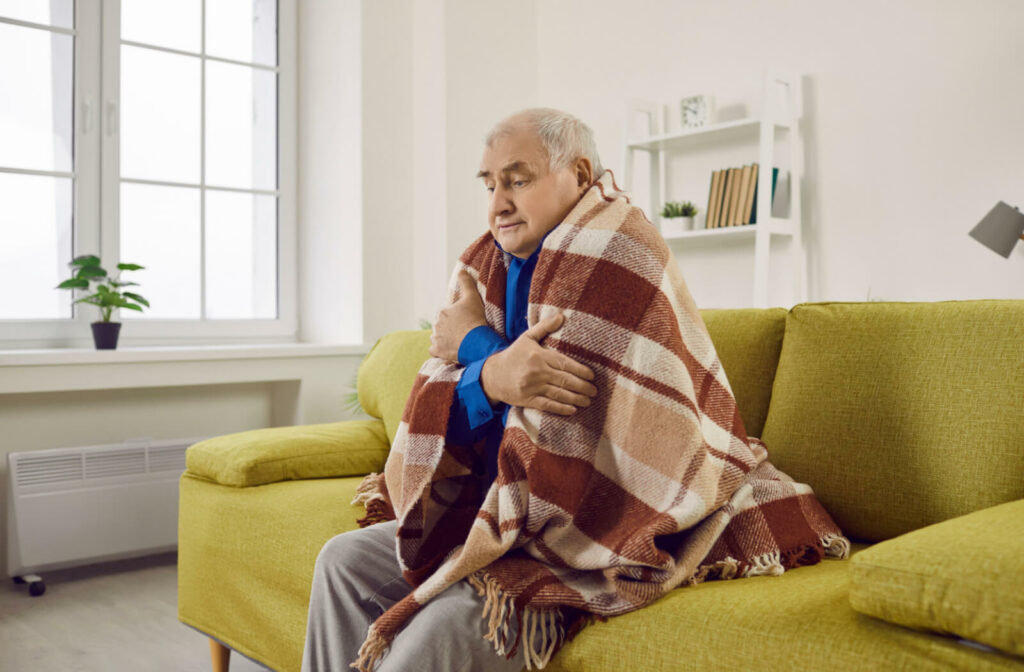It can become more difficult for our bodies to self-regulate our temperature as we age. This can be especially troublesome in seniors because they may not have the ability to consider everything needed to keep their temperature steady. Some tips to help regulate body temperature in the elderly include:
- Have them wear appropriate clothing.
- Keep their environment at a comfortable temperature.
- Encourage the senior to stay hydrated.
- Monitor the senior for signs of heat-related illnesses.
- Be mindful of their activity levels based on temperatures outside.
This topic is a great example of some of the benefits an older adult can reap while living in a senior living community. These communities typically have professional caregivers who can help residents with whatever they need in a day, including helping them regulate their body temperature in various ways.
Are Seniors More Sensitive to Varying Temperatures?
Seniors can be more sensitive to both hot and cold temperatures. Our bodies undergo various changes that can affect how we perceive and respond to different temperatures as we age.
One major factor is the senior’s metabolic rate. Metabolic rate refers to the amount of energy our body uses at rest. A lower metabolic rate can make it harder for our bodies to generate heat, which can make seniors feel colder more often.
On the other side of the spectrum, older people may also struggle with high temperatures. Our ability to regulate body temperature, a process known as thermoregulation, also decreases as we age. This can make it challenging for seniors to cope with high temperatures.
How to Regulate Temperature in the Elderly
There isn’t a one-size-fits-all answer on how to help seniors regulate their body temperature because it ultimately depends on a few factors, like the environment the older adult is in and their overall health. For example, hormone imbalances can make temperature regulation more difficult. So, it’s important to include the senior’s doctor if there are additional medical reasons for the lack of temperature regulation.
Dress Appropriately
Ensure that your loved one is dressed appropriately for the weather. Lightweight, breathable clothing such as cotton or linen is a good idea in hot weather. And it’s important to layer clothing to maintain warmth and avoid hypothermia in cold weather. Make sure to include a hat and gloves in cold weather as well.
Comfortable Environment
Keep the senior’s home or room temperature at a comfortable temperature level based on the weather outside. Set the thermostat at a cooler temperature during hot weather, and in colder weather, make sure to keep the home warm. Many communities will have professional maintenance staff that can ensure heating and cooling systems are functioning as they should.
Encourage Hydration
Encourage your loved one to drink plenty of fluids, especially water, during hot weather. Dehydration can lead to heat stroke, a serious and potentially life-threatening condition. You can also include water-rich foods in their diet, such as fruits and vegetables, to help keep them hydrated.
Monitor for Signs of Temperature-Related Illness
It’s important to know the signs and symptoms of temperature-related illnesses such as heat stroke and hypothermia in hot or cold weather. Heat stroke can cause confusion, dizziness, rapid heart rate, and dry skin. Hypothermia can cause confusion, shivering, and loss of consciousness. Seek immediate medical attention for the senior if you notice any of these symptoms.
Be Mindful of Activity Levels
Be mindful of the level of activity your loved one is engaging in during extreme temperatures. Avoid outdoor activities during the hottest times of the day in hot weather. And avoid activities that involve prolonged exposure to the elements in cold weather, such as shoveling snow. Perhaps you could encourage gentle exercise indoors as an alternative so seniors can maintain their physical activity.
Why Is Temperature Regulation Important?
To understand why it’s important to help seniors with their body temperature regulation, let’s consider some possible negative effects of hot or cold weather on seniors.
Possible Effects of Hot Weather on a Senior
It’s crucial to understand the potential negative effects of hot temperatures on seniors.
They are at greater risk of heat-related illnesses like heatstroke, heat exhaustion, and dehydration. Heatstroke is a severe condition that can damage the brain and other vital organs. It occurs when the body can’t cool down properly, and the body temperature reaches dangerously high levels.
Dehydration is another common issue. Seniors may not feel thirsty even when they’re dehydrated, leading to inadequate fluid intake. This poses a risk as water is essential in maintaining body temperature and ensuring bodily function.
Possible Effects of Cold Weather on a Senior
Persistent exposure to cold temperatures can lead to hypothermia, a condition where the body loses heat faster than it can produce it. Symptoms can include confusion, slow speech, loss of coordination, and in severe cases, it can even be life-threatening.
Additionally, cold weather can exacerbate existing health conditions a senior may already be experiencing. For instance, it can increase blood pressure and raise the risk of heart attacks.
Book a Community Tour with Us
Remember, everyone’s situation is unique, so it’s crucial to consider the individual needs of your loved one. Whether it’s about dressing appropriately, keeping their environment comfortable, or staying hydrated, every step matters.Contact us today at Tyler Mills Senior Living and speak with one of our staff. We’re happy to answer your questions about our approach to senior care and the level of respect and quality of life your loved one can expect in our community.



